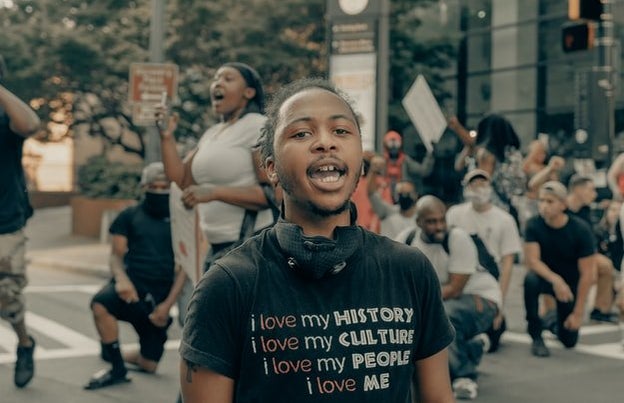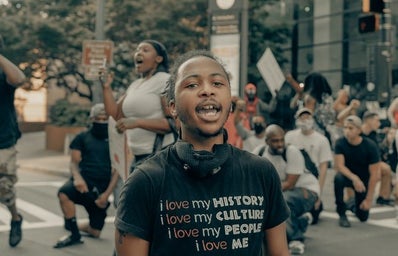Tomorrow marks the beginning of February, signaling the start of Black History Month here in the United States. The month owes much of its historical foundation to historian Carter G. Woodson, a prominent figure who formed the Association for the Study of Negro Life and History (ASNLH) in 1915. Through sponsoring the first national “Negro History Week” in 1926, the ASNLH ultimately propelled the creation of Black History Month which would only become officially recognized by President Gerald Ford in 1976 during the United States Bicentennial.
As we all venture into Black History Month together, it is vital we have open dialogues concerning how to engage in this annual observance. The events following the Spring of 2020 exposed a serious lack of general information on how to meaningfully support marginalized communities. Moreover, many were quick to note how a large portion of social media activism was often merely indicative of performative allyship, a state of being that typically only manifests in those more concerned with how they are contributing to causes optically, not substantively. Given this, I’ve laid out five ways you can meaningfully participate in Black History Month beyond simply posting a black square on your Instagram or hashtagging Black Lives Matter.
1. Challenge Your Capitalistic Beliefs About Productivity
Uh oh. I can already hear my “socially liberal fiscally conservative” readers rolling their eyes. In all seriousness, one of the best ways you can effectively engage in Black History Month this year is to question beliefs you may hold about a constant need to be “productive” and “grind.”
Though productivity or “hustle” culture may seem to have little to do with the Black community on the surface, Black Americans often suffer from pervasive social beliefs about the need to continuously work towards success regardless of what adverse circumstances may arise. In particular, racial stereotypes of Black people as lazy and unintelligent often drives them to compensate vis-a-vis overperformance. Moreover, the 2022 theme for Black History Month is “Black Health and Wellness” and spotlights the historical, often intentional, inattention to Black well-being and Black lives. Engaging with this theme means critically examining how socially-imbedded beliefs such as those of hyper-productivity may be harming the Black community.
2. Read, Read, and Then Read Some More
Though it may seem self-explanatory, reading is a vital component of being a good ally and observer of Black holidays and historical moments. For those who have access to local libraries and bookstores, I highly recommend seeking out introductory books to discussions about race. Such books include but are certainly not limited to:
- How We Get Free: Black Feminism and the Combahee River Collective Edited by Keeanga-Yamahtta
- How to Be Less Stupid About Race: On Racism, White Supremacy and the Racial Divide by Crystal Fleming
- How To Be An Antiracist by Ibram X. Kendi
If reading an entire book seems daunting to you or is simply inaccessible, venturing online to consume shorter pieces surrounding Black thought or visibility is also a great way to read important information. For example, modern Black thinkers Ta-Nehisi Coates and Nikole Hanna-Jones have essays that can be accessed on online news sites such as The New York Times and The Atlantic.
3. Pinpoint What Must Change
Now, I recognize this advice is broad. From incarceration to schooling to health care, there exists a seemingly never-ending list of things that society must change in order to correct the oppression faced by the Black community.
However, despite the length of this list, a lot of these necessary changes have become buzzwords as opposed to substantive impact. People often hear words like “prison reform,” “restorative justice,” or “universal healthcare” in the context of racial reform but often know little of the actual topics themselves or their importance. Using Black History Month as a time to really delve into these topics and gain a better understanding of their significance is an incredibly important way you can honor the underlying intentions of the weeks long celebration.
4. Honor bell hooks
Bell hooks (who prefers to spell her name with no capital letters “as a way of de-emphasizing her individual identity”), was and continues to be one of the most prominent figures in Black feminist literature. Hooks’ work typically addressed the deep intersections of race, gender and class and often pushed readers to deeply consider the systemic and persistent traits of oppression. Hooks passed away right before the new year on December 15th. This Black History Month, I highly suggest honoring bell hooks through reading at least one of her books. Her most notable works are:
- Ain’t I a Woman?: Black Women and Feminism
- All About Love: New Visions
- Feminist Theory: From Margin to Center
5. Confront Your Biases
Many are often unwilling and uncomfortable when it comes to grappling with the idea of implicit bias. Research on implicit bias has shown that “people can act on the basis of prejudice and stereotypes without intending to do so.” Despite evidence of the existence of this phenomenon, many are often resistant to admit to others, or even themselves, that they may hold implicit biases against certain groups of people, especially people of color.
However, the fact of the matter is that if you live in a country that has been colonized by Europe (a continent that colonized 80 percent of the entire world by the way) you likely have some implicit biases founded on racial stereotypes that favor whiteness over all else. As hard as this can be to accept, acknowledging these biases is an incredibly important step towards racial progress you can take during Black History Month. If you are interested in confronting your biases this Black History Month I strongly recommend taking the Harvard Implicit Association Test online. This test allows you to confront a number of different biases that include but are not limited to racial bias.
At the end of the day, these suggestions only represent some of the many ways you can be a good participant in Black History Month! Whether you choose to read, listen to silenced voices, or confront your own biases, at the end of the day the most important part of the month will be recognizing that though Black History Month may be constricted to February, Black history is always happening around us.


